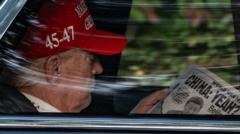As the US begins imposing a 10% tariff on imports, market indices have seen significant drops, leading President Trump to urge citizens to stay resilient. Global reactions have included protests against new economic policies and retaliatory measures from countries like China, causing ripples across international markets.
Market Turmoil and Protests as Trump Enforces New Tariffs

Market Turmoil and Protests as Trump Enforces New Tariffs
President Trump calls for resilience as the US implements a 10% tariff across all imports, sparking global market declines and widespread protests.
As the US government begins collecting a 10% "baseline" tariff on all imports, President Donald Trump is urging the American public to "hang tough" amidst the financial chaos resulting from the new policy. The tariff, which came into effect on Saturday, has already had a pronounced effect on international markets, with significant declines observed in the UK, France, and several Asian economies.
The announcement of the tariffs triggered a surprising downturn; all three major US stock indexes faced substantial drops of over 5% last Friday, marking the worst week for the stock market since 2020. In response to the situation, thousands of citizens took to the streets in Washington DC and other major cities to express their discontent with the Trump administration’s handling of economic issues and other government policies.
President Trump characterized the ongoing market volatility as an “economic revolution,” maintaining that the US is poised to emerge victorious. “Hang tough, it won't be easy, but the end result will be historic,” he proclaimed in a statement on Truth Social, as he calls for national unity in face of these challenges.
The shakeup in trade relations has disrupted global supply chains, leading to steep declines in European markets. The UK's FTSE 100 dropped nearly 5%, the steepest decline in five years. In response to a grim economic landscape, Elon Musk, a Trump ally, suggested the potential for a "zero-tariff situation" that could establish a free-trade zone between Europe and North America.
In prior terms, Trump distanced himself from a proposed free-trade deal with the EU, but the recent rollout of tariffs on imported goods—with further increases on certain items planned for April—has reignited fears of an escalating trade war. British Prime Minister Sir Keir Starmer has been proactive, engaging in discussions with international leaders to address their mutual concerns over the economic fallout from the new tariffs.
As retaliation, China has enacted its own tariffs of 34% on certain US imports and has lodged a complaint with the World Trade Organization. Chinese officials condemned the US’s use of tariffs, demanding an end to what they see as economic aggression.
In conjunction, around 1,200 protests across the US were anticipated, marking what has become one of the largest expressions of dissent against Trump’s administration since his policy shifts. Notably, Jaguar Land Rover paused all shipments to the US to adapt to the evolving trading climate, highlighting the real-world impacts of the tariffs.
The global community continues to watch closely as the implications of these tariffs evolve, with countries navigating the complexities of international trade amidst rising tensions.





















